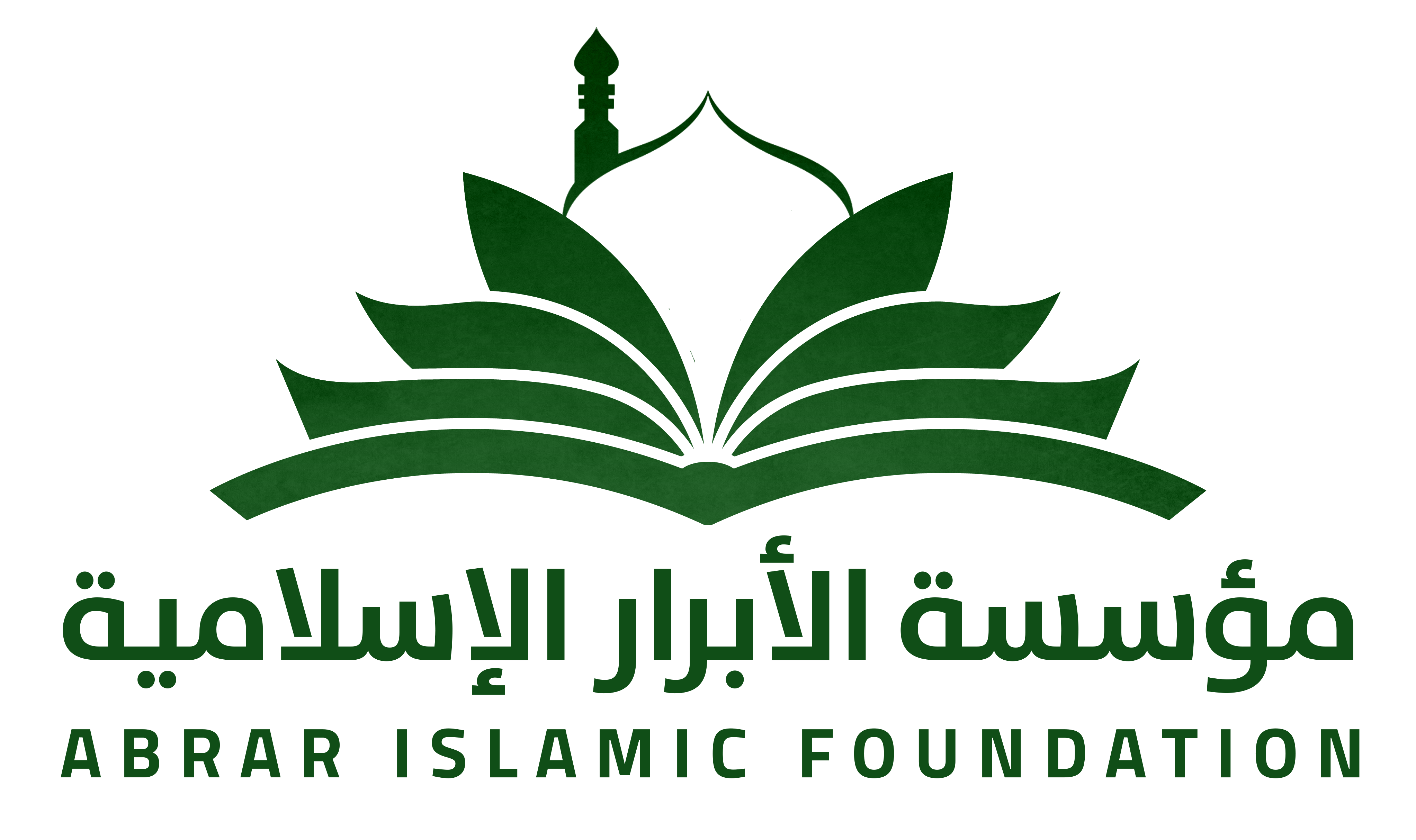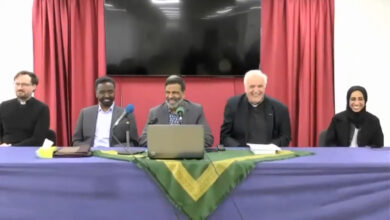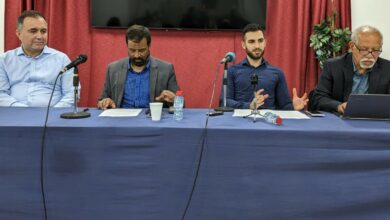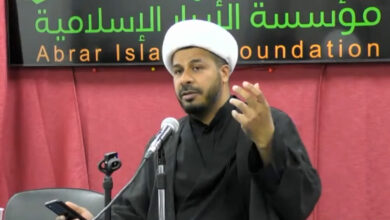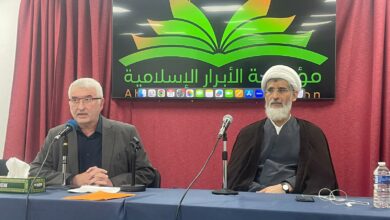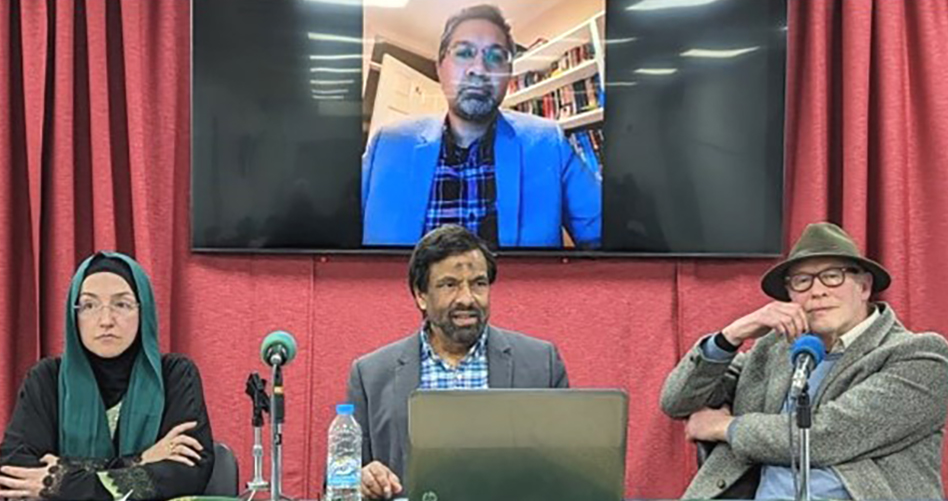
Relevance and sanctity of the holy scriptures
The divine scriptures have been a source of knowledge and moral guidance to the majority of the earth’s population for many centuries. In the Christian faith: In the beginning was the Word, and the Word was with God. For Muslims the beginning was the divine command to Mohammad: Read. These are the foundations of the holy scriptures which, in their original forms, are the absolute truth. How can people relate to them? What is their position within human society today? Are divine scriptures the beginning or the end of knowledge? How divine are the holy books of the main Abrahamic religions? Since they are at the heart of mankind, their sanctity must be preserved and respected. Insulting them is an abhorrent act against their followers.
William Haines: The Christians and I think also the Muslims believe that Jesus is the messiah. The early Christian church was regarded as a Jewish sect. There are Jews who believe that Jesus was a messiah while most Jews do not believe that Jesus was a messiah. So they are always arguing with each other: the Jews who believed that Jesus was a messiah and the ones who do not believe that he was a messiah. The Hebrew bible was their source of authority and their scripture.
Christian church was regarded as a Jewish sect. There are Jews who believe that Jesus was a messiah while most Jews do not believe that Jesus was a messiah. So they are always arguing with each other: the Jews who believed that Jesus was a messiah and the ones who do not believe that he was a messiah. The Hebrew bible was their source of authority and their scripture.
Later on, the letters of some of the apostles like Paul or Peter which were collected together and as the apostles started to die and people realised we need to write down and record the life of Jesus and the teachings of Jesus. And you get what is now known as the New Testament.
But within the early Christian church there was a movement called Gnosticism and the Gnostic view was that God of the Old Testament was a vengeful God. They did not read the Old Testament because the God of the Old Testament is a vengeful God, and an angry God, not a loving God. We do not believe that. It is a complete misrepresentation of how God is within the Old Testament.
They just wanted to have the gospel of Marcia which is pretty much just the gospel of Mark. So the early church rejected that. At the end of the day, Jesus was a Jew. There is nothing that Jesus taught which is different to what you find in the Hebrew bible. And so that is why they decided it is important to keep the Hebrew bible and we will attach the New Testament onto the back of the Hebrew bible. The New Testament was written by Jews who believe in Jesus and that became the New Testament.
Because Jesus is a Jew it is impossible to understand Jesus without accepting and acknowledging and accepting the Hebrew bible. There is a conversation between the Old Testament and the New Testament. It is impossible to understand the teachings of Jesus without understanding the fact that he was a Jew.
The Christian view is complicated about the word of God. They say that Jesus was the word of God. It was not that he was given the gospel in the way that Mohammed received the Quran. Christians believe that Jesus himself was the word of God. So when he spoke he was expressing God’s word because he himself was the incarnation of the word of God. So there is a different understanding of what is going on there.
I find this very helpful. The divine principle and the teachings of Sun Young Moon acknowledge the authenticity of other religious scriptures I have read the Quran but I realised that I can’t understand the Quran without also understanding the Hebrew bible and the New Testament.
And I personally think it would have been great if the Muslim community had just decided to stick the Hebrew Bible onto the New Testament and then you would had a conversation between these three different testaments. The Quran refers to the prophets of the Hebrew bible but there is very little detail in the Quran about the prophets of the Hebrew bible.
I think it would have been wonderful if they were together and we could have had a conversation about the Hebrew Bible and the New Testament and that is my view coming from the background of the Unification Church.
Dr Imranali Panjwani: May this session be a blessing to all of us. In the name of God the merciful and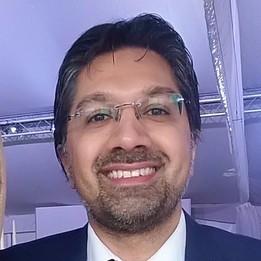 the compassionate may his peace be upon all of you. Salam Aleikum.
the compassionate may his peace be upon all of you. Salam Aleikum.
Thank you for inviting me. As was advertised this seminar is based on the nature and revelation of the Quran, its relationship with human beings, its purpose as per the questions posed in the description and also in a contemporary sense why we are discussing this issue today after the burning of the Quran in Sweden and more generally extremism against Muslims throughout the world. I am writing an article at the moment for the Commonwealth Roundtable Journal published by Taylor Francis dealing with right-wing extremism in India based on the Hinduvata ideology that persecutes Muslims.
There seems to be a trend towards subjugating Muslims or having a particular perception that Muslims are threats to society or the Quran is a barbaric revelation and this perception justified the oppression of Muslims whether they are a minority society in any nation or state or in general in rhetoric in the media.
So my humble purpose is to explain what the purpose of the Quran is to give some specific examples. William Haines clarified some misconceptions in reference to the Hebrew prophets and really the Quranic conception of the prophet.
The first thing is what were the initial verses of the revelation of the Quran. According to the majority opinion, the first five verses that were revealed were in Chapter 96. Read in the name of your Lord who created man from a clinging mass read and the Lord is the most generous taught by the pen man what he did not know.
The reason I start with this is that according to those who interpret the Quran whether Shia or Sunni these verses identify that the purpose of the Quran is to promote man or human beings from a state of ignorance to a state of knowledge. But I think rhetoric is used to cause division between religions and sects and we are talking about identities like Muslim, Christian or Jews.
The purpose of the Quran was not that because otherwise, we would have different passages revealed. Why were the verses about prayer not revealed? Prayer is a fundamental pillar of Islam. Why wasn’t that revealed? Or the concept of theological beliefs. Why not other verses related to that with which we would readily identify as part of the Islamic faith or any monotheistic faith.
Because according to interpretations of the Quran or any monotheistic faith lots of the Quran was to address a tribal society who were fighting among themselves based on tribal superiority and on certain immoral norms like the burial of female babies, or the subjugation of women or ignoring poor people and indeed not developing a progressive, successful harmonious society.
Hence the revelation of these verses would signify that one human being can be superior to another. We are created from a clinging mass or a blood cloth. I am not superior to you and you are not superior to me unless God judges my deeds and propriety.
It is a notion of acknowledging that Ilm or knowledge stems from this knowledgeable being who we call God or Allah. Allah is not a selfish being. He is generous. The command is given to reciting (not read because the prophet did not have a book in front of him). Recite in the name of him who was most generous to you. He who taught by the pen. So the significance of the pen is a signification of the instrument of knowledge and Allah teaches human beings what they did not know.
So these verses establish Prophet Muhammed increasing his knowledge through divine inspiration and that transforms knowledge to society to elevate society from a state of ignorance to a state of knowledge.
There is a context in which this revelation took place. I want to give you an idea of the beautiful relationship between Prophet Mohammed and God. When it was the night on which God honoured him with his mission and showed mercy on his servants and Gabriel came to him.
The reason I am sharing this with you is that Muslims argue that the reason why we respect and follow Prophet Mohammed is because the revelation was not a copy of the Bible or the Torah. We believe that all of these scriptures have to be respected and they are from God and there is a natural continuity there.
But the Quran is not as if the Prophet went into the cave of Hira and started copying books down. The Quran addresses this in Surah 29 verse 48. You do not recite any scripture before it nor did you write it with your right hand. Those who wanted to criticise the Prophet would have been skeptical.
So the reason why the Prophet could not read or write which was not a convention. In Arab society only a handful of people could read and write because memorisation was the convention. Memorisation of poetry and memorising things, in general, was the way the convention operated just as today we have a new convention which is the digital convention.
So the reason he could not read or write was exactly this he was preparing himself and God was preparing him to receive this unique inspiration of the Quran. So when we look at these initial stages of revelation we find two basic trends. We find knowledge as the central purpose of the Quran that is personally related to the Prophet and this knowledge was unique but at the same time offered continuity with the scriptures that had come before like the Bible or the Torah or the Psalms of David preaching one God, doing good deeds and trying to reform society through those messages.
But the Quran was particular in addressing some of those issues like tribal practices because each shariah or code or way differed between each revelation addressing the needs of the time.
The previous speaker said it would have been good if the Quran had focused more on the Hebrew prophets for example or the question of continuity. Why did the Muslims slap the Quran on the back of the Bible or the Torah?
To address this misconception (surah imran verse 84). We believe in God and in that which has been bestowed from on high upon us and that which has been bestowed on Abraham, Ismael and Ishaq and their descendants and that which has been said by their sustainer Moses and Jesus and all the other prophets. We make no distinction between any of them and unto them we surrender ourselves. You see the last reference to all of these prophets are the Muslims.
I want to address three issues:
One: there is 100 percent continuity in the Quran – 100 percent with the teachings of all the previous prophets. So Prophet Mohammed and his believers at the time and Muslims today accord equal respect to all the prophets and want to learn from them and their scriptures. That is what all children are taught in the madaras they go to.
Two: according to the Quran itself one was to address the specific needs of the society at the time and according to Quranic documents there had been certain deviations or corruptions or amendments in the previous scriptures which had perhaps changed the original conception of God. And I understand that there is a philosophical discussion about the trinity and one God.
Three: there are specific chapters addressing for examples the chapter of Joseph or the chapter of Mary or the reference to Moses so many more times than the Prophet Mohammed himself. So the Quran not only accepts and advances continuity but it does not use a religious label to identify the prophets. A Muslim is simply someone who surrenders to God. That is how prophets identify themselves.
I am ending on this verse from the Quran: We created you from a male and a female, and made you into peoples and tribes so that you may ˹get to˺ know one another.
This is an address to all human beings that human diversity is natural and acknowledged that we must recognise each other and strive for God consciousness not a particular religion as such but consciousness which Allah brings us beyond cultural, tribal and religious divisions.
Dr Rebecca Masterton: Thank you very much for the invitation to speak. In the name of God the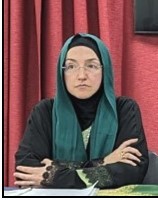 most merciful and compassionate. I spent a lot of time thinking about the culture in which we are living today, the culture into which I was born and coming into Islam and what drew me into Islam and my observations on what we are feeling when someone comes into Islam or someone leaves Islam.
most merciful and compassionate. I spent a lot of time thinking about the culture in which we are living today, the culture into which I was born and coming into Islam and what drew me into Islam and my observations on what we are feeling when someone comes into Islam or someone leaves Islam.
We have seen in the last 100 years particularly from the 1920s a dramatic secularisation of global culture and of course this project of secularization has taken place in this country.
One does not realise that if you were not born into this secular culture and you have no reference to that culture then you don’t realise that there are other world views. The current trends of thinking in modern, secular European culture are that the religious texts are outdated, irrelevant and even backward or even holding humanity back and they have no place in a so-called modern society.
This was the kind of environment that I grew up in. It wasn’t anything explicit but there was a kind of implicit consensus that the Bible was not relevant and that indeed the God of the bible was an entity that was oppressive and restrictive of humanity and Christianity was just about hell and damnation and condemning people and that modern secular society was a move on from this backward world view.
This is one of the components that goes to the heart of this clash of cultural perceptions that we see taking place in places like Sweden. Having come into Islam I can also see where sometimes there is a kind of crossing of wires going on in terms of how Muslims try to explain themselves to secular Europeans or Scandinavians and how Scandinavians or Europeans are trying to make themselves understood to Muslims.
Those who have been raised in a secular culture – that can include Muslims as well as not all Muslims have been raised as practising Muslims. We also have Muslims who have returned to practising Islam for their own reasons. What we have with this kind clash between a secular world view and a prophetic world view is this clash of perceptions and we have two groups who are arguing with each other that their perception of what existence is and the purpose of human life. Two different world views that are arguing against each other.
Those who come into a prophetic path or those who are living within a prophetic worldview but in a secular society will be negotiating these two worldviews. We are living with one foot in the prophetic worldview and with one foot in the secular worldview.
I am going to take the opportunity to plug my stories here. This is what I was dealing with in 2008 in Passing through the dream. It is a collection of supposedly fictional stories but what these stories do is explore our experience of living in two world views side by side and how we negotiate that switch between the two.
One fundamental difference between the secular worldview and the prophetic worldview is that the secular worldview has been raised through traditional metaphysics. So for centuries we have a society that was founded upon this understanding that there are different levels of existence. The material realm is the lowest realm of existence and then we have higher spiritual realms until we reach the angelic realm and then the realm of the divine.
As is famously said at the beginning of the 20th century with the introduction of existentialist philosophy the phrase became that the modern world sees the end of metaphysics. We are now in an era where metaphysics has been taken out of the human worldview and the human experience of existence.
This is what I was grappling with when I came into Islam. I wanted to come into Islam in 1997 but I formally converted two years later. I was negotiating within myself two different people and their identity.One person that has been constructed in a world view that has a particular perception of existence. That perception of existence is not interested in spiritual realms after life or the life or pre existence. That perception of existence only acknowledges the material realm. The self that was constructed in a world view that only acknowledges the material realm and that self was expected to play along with that world view and to act as if there is no realm of pre existence, there is no after life. One is expected to live one’s life as if these realms do not exist.
This created a great sense of dis ease, a great sense of angst and unhappiness and a profound sense that something is wrong but I can’t define it clearly because I haven’t been given an alternative model on which to reflect back on what is wrong with the secular model that I have been given.
So in encountering Islam a way of life that acknowledges the higher levels of existence, the afterlife it acknowledges what we have different components as human beings: we have the material aspect and our spiritual aspect that corresponds to the spiritual realm and that is the norm and a given. When I visited Muslim countries I noticed that it was a given worldview. It was the living element in Muslim societies that I was going into and experiencing. So in a sense Islam provided a way out and that is where you also find a kind of paradox because now we are meant to be in a society that promotes freedom – many different kinds of freedoms.
But it is a paradox because if you are living in a society that only acknowledges the material realm then in a sense you have been boxed in spiritually and existentially into a particular world view and it is very suffocating. And when you go back to the prophetic path which is all about transcending this material level of existence it opens you up to a much wider horizon and you can breathe.
So just to go to the Quran. I think we can have some practical takeaway points from here if we are reflecting on what is revelation, what are the prophetic texts and ultimately how can we communicate what we understand of the sacred texts. How can we communicate that to a society that has largely forgotten what revelation is. If we were to really argue effectively that the Quran still has a purpose in our lives then we would need to go back and kind of help people to understand not only intellectually but also experientially that there are higher levels of existence, that there are multiple levels of dimensions of existence to the human being.
So there needs to be a much more effective way of communicating about this. Not only to talk about it theoretically but to be able to provide an environment where people can experience that. I came to Islam through experience. It was not through reading a book. I first experienced the presence of Islam, the importance of the Quran in society and then after that I started to read the Quran.
What you find when you come into Islam is the focus and a lot of the discussions among Muslims is the focus on the Quran and what it says within itself but there isn’t a lot of discussion about the context in which the Quran was revealed apart from the usual discussion about how it came into a society where the culture was for girls to be buried and lack of rights for women.
You are not really told a lot more about the kinds of society in which the Quran was revealed. When you do read the Quran you notice that if you read back into the biblical tradition then you realise his ire is referring to this part of the bible. This is a conversation that the Quran is having with the Jews and the Christians in Arab society at the time.
In order to understand the message of the Quran the role of the Muslims is not to bang the drum and say how dare you insult our book and our book is sacred but rather the role of the Muslims is to obtain a deeper understanding of the Judeo Christian tradition in which the Quran was revealed and it is only through understanding the conversation that the Quran was having with the Jews and Christians that you can understand better what the message of the Quran is.
So I will conclude here and maybe we can have a q and a in sha Allah.
*William Haines is a pastor with the Federation for World Peace and Unification Studies. He graduated from the Unification Theological Seminary. He is the author of several text books on character education that are taught at schools in the Russian Federation. William also lectures on topics related to theology.
**Dr Rebecca Masterton is a lecturer in Islamic Studies and is currently Director of Online Shi‘a Studies, having taught at Birkbeck College and the Islamic College. She converted to Islam in 1999 and obtained her doctorate in the francophone and Islamic literature of West Africa from the School of Oriental and African Studies, University of London, in 2006. Her articles are available on Academia.edu and she has published two books: Shi’i spirituality for the 21st century and: Passing Through the Dream. She has been an anchor presenter for various media including Sahar TV, Hadi TV, Press TV and Ahlulbayt TV.
***Dr Imranali Panjwani has lived, studied and worked in the UK, the Middle East and Australia as an academic, lawyer, chaplain and community worker. He is a Senior Lecturer in Law at Anglia Ruskin University and the Head of Diverse Legal Consulting. He researches Islamic and Western Law focusing on the subject of the law, interpretation of scripture, moral development and access to justice and human rights for minority communities. His country expert reports for asylum seekers and refugees have been commented upon by judges and lawyers and draw upon his diverse legal, cultural and religious experiences.
